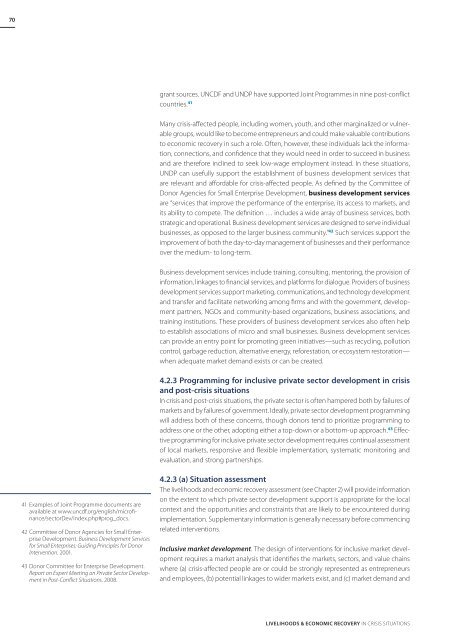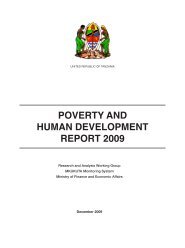Download PDF (4.08 MB) - ReliefWeb
Download PDF (4.08 MB) - ReliefWeb
Download PDF (4.08 MB) - ReliefWeb
You also want an ePaper? Increase the reach of your titles
YUMPU automatically turns print PDFs into web optimized ePapers that Google loves.
70<br />
grant sources. UNCDF and UNDP have supported Joint Programmes in nine post-conflict<br />
countries. 41<br />
Many crisis-affected people, including women, youth, and other marginalized or vulnerable<br />
groups, would like to become entrepreneurs and could make valuable contributions<br />
to economic recovery in such a role. Often, however, these individuals lack the information,<br />
connections, and confidence that they would need in order to succeed in business<br />
and are therefore inclined to seek low-wage employment instead. In these situations,<br />
UNDP can usefully support the establishment of business development services that<br />
are relevant and affordable for crisis-affected people. As defined by the Committee of<br />
Donor Agencies for Small Enterprise Development, business development services<br />
are “services that improve the performance of the enterprise, its access to markets, and<br />
its ability to compete. The definition … includes a wide array of business services, both<br />
strategic and operational. Business development services are designed to serve individual<br />
businesses, as opposed to the larger business community.” 42 Such services support the<br />
improvement of both the day-to-day management of businesses and their performance<br />
over the medium- to long-term.<br />
Business development services include training, consulting, mentoring, the provision of<br />
information, linkages to financial services, and platforms for dialogue. Providers of business<br />
development services support marketing, communications, and technology development<br />
and transfer and facilitate networking among firms and with the government, development<br />
partners, NGOs and community-based organizations, business associations, and<br />
training institutions. These providers of business development services also often help<br />
to establish associations of micro and small businesses. Business development services<br />
can provide an entry point for promoting green initiatives—such as recycling, pollution<br />
control, garbage reduction, alternative energy, reforestation, or ecosystem restoration—<br />
when adequate market demand exists or can be created.<br />
4.2.3 Programming for inclusive private sector development in crisis<br />
and post-crisis situations<br />
In crisis and post-crisis situations, the private sector is often hampered both by failures of<br />
markets and by failures of government. Ideally, private sector development programming<br />
will address both of these concerns, though donors tend to prioritize programming to<br />
address one or the other, adopting either a top-down or a bottom-up approach. 43 Effective<br />
programming for inclusive private sector development requires continual assessment<br />
of local markets, responsive and flexible implementation, systematic monitoring and<br />
evaluation, and strong partnerships.<br />
41 Examples of Joint Programme documents are<br />
available at www.uncdf.org/english/microfinance/sectorDev/index.php#prog_docs.<br />
42 Committee of Donor Agencies for Small Enterprise<br />
Development. Business Development Services<br />
for Small Enterprises: Guiding Principles for Donor<br />
Intervention. 2001.<br />
43 Donor Committee for Enterprise Development.<br />
Report on Expert Meeting on Private Sector Development<br />
in Post-Conflict Situations. 2008.<br />
4.2.3 (a) Situation assessment<br />
The livelihoods and economic recovery assessment (see Chapter 2) will provide information<br />
on the extent to which private sector development support is appropriate for the local<br />
context and the opportunities and constraints that are likely to be encountered during<br />
implementation. Supplementary information is generally necessary before commencing<br />
related interventions.<br />
Inclusive market development. The design of interventions for inclusive market development<br />
requires a market analysis that identifies the markets, sectors, and value chains<br />
where (a) crisis-affected people are or could be strongly represented as entrepreneurs<br />
and employees, (b) potential linkages to wider markets exist, and (c) market demand and<br />
Livelihoods & Economic Recovery in Crisis Situations





